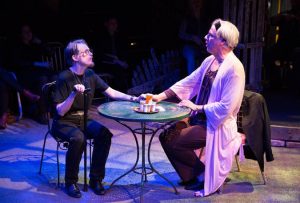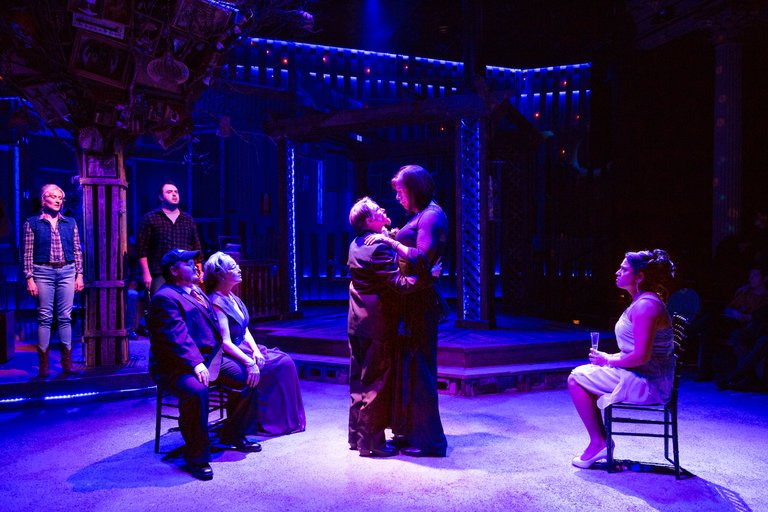The family in “Southern Comfort,” a sweetheart of a musical that opened on Sunday at the Public Theater, behaves as most families do. Its members are loving and supportive, but also prone to conflict over things small and large. Father and son squabble over sexual politics. Son resents the stepmother on the horizon. Offense is taken when a much-loved picnic dish is ignored.
But there’s a difference. The clan in this musical is not related by blood. Its members are a grab bag of folks brought together by the unofficial patriarch, Robert Eads, who was born Barbara but has transitioned to a male identity. He has gathered around him a couple of other similar men and their partners, creating a tight-knit community in, of all unlikely places, a rural Georgia town.
If this sounds familiar you probably saw the documentary film the musical is based on, which won a grand jury prize at the Sundance Film Festival in 2001. Lest you assume that the theater is jumping late on the transgender bandwagon, I should note that the musical, with book and lyrics by Dan Collins and music by Julianne Wick Davis, and direction by Thomas Caruso (who conceived it with Robert DuSold), has been in development for more than 10 years and has had two prior runs.
Now in the Anspacher Theater, Robert’s “chosen” family has found a suitable new home. Never has this space felt more intimate and inviting. James J. Fenton’s rough-hewed set design deftly disguises one of the thick columns, which can be problematic, as a tree trimmed in Joseph Cornell-style boxes full of bric-a-brac. Shadows of a picket fence ring the floor of the stage. But it’s the spirited, tuneful country score and the colorful characters that draw us close to the emotional ups and downs of Robert’s family.
This cast is entirely winning. Most remarkable — even flabbergasting — is Annette O’Toole. I noticed her name in the program before the show began, but only halfway through the first act, as I was wondering when she was going to show up, did I realize that Ms. O’Toole had been there all along, playing Robert himself, the reed-thin fellow in the black cowboy hat.
It’s not a matter of mere cosmetics, although Ms. O’Toole looks quite like the lanky Robert did in the film, with a sprig of a beard on her chin and a mustache lining her lip. More important, Ms. O’Toole has disappeared inside her character, drawing a moving, indelible portrait of a man who retains an unflappable spirit even as death draws near.
That’s not a spoiler. We learn early on that Robert has terminal ovarian cancer. The cruel irony of this is noted by Jackson (the forceful Jeffrey Kuhn), a younger transgender man whom Robert treats as his son. He curses a God that would sicken Robert in “the last and only part o’ you that’s still female,” as he says to “Pops.”
But Robert takes his diagnosis in stride, refusing to give up on life until it gives up on him. Meantime, he’s going to make the most of it, having fallen hard for Lola Cola (the veteran Jeff McCarthy, deftly switching from his baritone to a falsetto in his big number). This causes some friction with Jackson, who’s suspicious of the newcomer.
Robert has a bone or two to pick with Jackson as well. He’s been urging him to settle down and stop looking “for the next bed to jump into.” But when Jackson begins seriously dating a transgender woman, Carly (a delightfully brash Aneesh Sheth), and confides that he is considering phalloplasty, Robert flares up. He believes that gender is a matter of mind and spirit, not genitalia.
Watching the increasing friction is another couple drawn into Robert’s warming orbit: Sam, played with vibrant energy by Donnie Cianciotto, and his wife, Melanie, whom Robin Skye imbues with a breezy geniality. Among the funnier passages is Melanie’s recounting of her initial suspicions about Sam: “Whew, Lord, the first time Sam showed up at my place I had a gun hid under the cushion o’ my couch the entire time,” she tells us. “Funny thing is, he was the first man in my life who I didn’t need protectin’ from.”
Part of the appeal of “Southern Comfort” is the contrast between the subject and the musical style. Many people tend to associate country music, rightly or wrongly, with Confederate flags and closed minds. Ms. Davis’s shapely melodies, beautifully played by a five-piece band at the back of the stage (all but one band member plays a small role in the show), could come from country radio today. But as sung by characters who would likely not be welcomed at the Grand Ole Opry anytime soon, the songs take on an almost radical charge.
In expanding on the relationships depicted in the film, Mr. Collins and Ms. Davis have some trouble integrating the amplified story lines smoothly. (With 19 songs, and reprises, the score could benefit from a little winnowing, too.) Will Robert and Jackson resolve their differences in time? Will Lola agree to join Robert at “SoCo,” shorthand for Southern Comfort, the annual transgender convention in Atlanta? Will Sam’s parents finally accept him as he is? Will Robert’s?
Some answers are obvious, but for the most part this musical avoids the trap of sentimentality. And it’s fitting that the show errs on the side of largess, granting characters their full, complicated humanity without shying away from addressing the hardships they face. While these characters may not always be comfortable in the world they live in, we come to see that they are entirely comfortable in their own skins.

